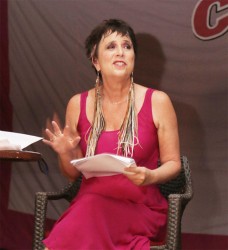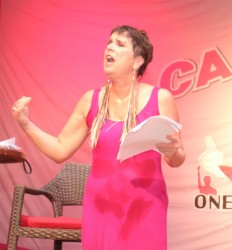Eve Ensler is a woman driven by the pain she sees her sisters across the globe suffer and while she will not be able to purge the world of violence against women and children in her lifetime her work is nevertheless making an impact, including through raising funds to assist those in need.
Known worldwide as the woman who scripted the now famous The Vagina Monologues out of which was born the recent One Billion Rise campaign, American-born Ensler’s work cuts across culture, race, class and religion.
During her over twenty years of work Ensler has received a great deal of criticism – some are of the opinion that she is just a white woman trying to tell coloured women what to do, more so what to do with their bodies – but she has shrugged this off and continues to travel the globe and lend a helping hand.
Her aim is to help grass roots women worldwide organise and come up with strategies to better address the scourge of violence against them, and it was for this reason she was in Guyana recently on a visit which was facilitated by Caribbean American Domestic Violence Awareness (CADVA).
Abused as a child by her father and a cancer survivor, the award-winning playwright has also written her memoir titled In the body of the world in which she is said to have spoken freely about her life struggles.

“I grew up in what appeared to be a white middle class family, in a nice community with a handsome father and a pretty mother and inside my family it was just hell… Inside my family my father was madly violent, a perpetrator,” Ensler said in a recent interview with the Sunday Stabroek.
She said the direction of her life is a consequence of that violence, since being abused more than likely means you would have solidarity with women who have been through that.
“What keeps me going is the desire to end violence against women and girls, period, and really being in that struggle and fighting for that struggle,” Ensler said in the interview.
It has not been easy because even as she and many other women continue to tackle the issue of violence against women it is still being perpetrated almost with impunity, but Ensler said that some changes have been seen and she is optimistic. Laws have been changed, men are becoming involved, it is now a front page issue and it is being taken seriously in arenas where it would have been brushed aside before.
“To see women claiming their bodies and claiming their powers and saying that violence against women needs to be taken seriously, that is change… But has it ended it? No, not yet.”
Even though her activist work has consumed her, Enlser does not feel that she has denied herself; rather she describes her life as amazing and one that she has chosen.
“To be an artist and to be an activist I don’t think there is a better life than that. Do I have a partner and a marriage and a home? No, I don’t have those things. But I have a son who I adopted and I have two grandchildren who I am very close to and I spend much time with.”
For her, the work is her life and she does not see them as separate.
It was after she started performing the Vagina Monologues and it generated a reaction from women who had horror stories to tell, that the passion to do more work in the area was triggered. “I felt almost immoral in a way not doing more than just a play; it felt like I couldn’t be privy to so much information and not do something.”
And something she did. And so that was the catalyst for the decision taken in 1998 to use the play to serve women and to stop violence against women. This opened more doors and though she never dreamt of this being her life one thing after another unfolded and led to yet another.
The monologues
While she was a small time writer and artist, the idea of the Monologues came to Eve after listening to an older woman who was going through menopause talk about her vagina, and who told her “things that really surprised me.” This led her talking to other women about their vaginas and it all became so fascinating that she took notes.
“The next thing I knew I heard a story that really moved me and it provoked me to write a fictional monologue, and I read it one night in a café and people were like, ‘Oh my God, you must do this,’ and that is really how it began,” she disclosed to the Sunday Stabroek.

The story that really moved her was that of the older woman who had a very humiliating sexual experience and she had stopped having sex.
“That really shattered me because I couldn’t believe someone had not had sex their whole life…”
For the play she interviewed about 200 women in America but they were a diverse group from different parts of the world. However, she made it clear that the Monologues are fictional but with little pieces of stories.
Initially she started performing the play in a small theatre in New York, but it quickly spread like wildfire and more and more woman started telling stories.
“I literally had women pouring into my office to talk about their vaginas, and then I was really a poor artist, I had no money I was like living from pay cheque to pay cheque but it was really beginning to take off.”
An evening was then planned with the aim of raising money which was the launching of V-day, a movement to end violence against women and girls, and once that started women from all across the world responded with proposals and an “amazing energy started.”
Apart from being abused by her father – she was beaten and raped by him for five years – Enlser said that being diagnosed with cancer four-and-a-half years ago was the biggest event in her life. She described it as a “radical shocking experience to be diagnosed with stage four cancer, discover a tumour inside me… within days I was in a nine-hour surgery and then months of treatment; it was pretty gruelling.”
But it was that experience that landed “her back in her body for the first time,” and ever since she has been in a really good place.
Over the years she has been adding to the monologues as she hears more and more stories, but she has since stopped because as she puts it, “I don’t want to write any more story of horror; I want to create better energy.”
For her, women are born open, sexual and erotic, and it is the world which makes them “shut their beautiful being down.” The work is to help “women come back into their bodies…”
Criticisms
Ensler has been heavily criticized for her work, and one criticism was that she glorified rape in one of the monologues which spoke about a young girl having sex with an older woman, which the now adult woman said had healed her. It was concluded that “if it was rape it was good rape.”
She described those who criticised as “very right wing” who do not want women to be free, and some wanted the Monologues shut down. She recalled that this particular monologue was based on what she was told by a woman in a homeless shelter, who was raped as a young girl but ended up having an affair with a woman later.
“She said it was the lesbian experience that had changed her life and given her back her body. Now art is complicated…it is not necessarily politically correct…” Ensler said, adding that she did not know at the time the Monologues would have become a big thing.
She was just telling a story that she thought was really interesting of a woman who described a lesbian affair with an older woman when she was a child, which made her love her vagina and she did not feel raped.
Following the criticisms Ensler changed that particular monologue.
Saddest for Ensler is the fact that a lot of criticisms levelled against her publicly are from women, and she disclosed the one moment in her life which she regrets is where she criticised another woman publicly.
“I feel like we don’t trust each other, we don’t trust each other’s intentions…” said Ensler when explaining the reason why women tear each other down publicly.
While there could be legitimate concerns, Ensler said they should not get into the realm of attacking people’s characters and assassinating their personalities. She feels loved, but there are times when pockets of people rise up and are very “attacking, and are haters and it used to really devastate me because I just didn’t understand it.”
Lies and inaccurate interpretations of issues are what affect Ensler the most, and she has reached a point where she no longer responds to attacks, concluding that any time someone stands up for something they will be attacked. She has not reached a point where she does not heed valid criticisms.
“And it is not that it hasn’t hurt me, but on the other hand… millions of women are rising on the planet and a pocket of twenty or fifty people [are criticised] – you have to balance it out.”
She has been labelled the white woman who visits poorer countries and tells women what to do, but Ensler questions how she could do that. “How could I be so powerful?” she asks, adding that in countries like Kenya and the Congo where she has worked women were already doing the work and she just supported and helped to raise funds. In Congo V-day helped to raise resources to build a refuge named ‘City of Joy’ for abused women, which is run and operated by Congolese women. In Kenya support is given to two safe houses for girls operated by a women rights leader and there is also a place for abused women supported in Kabul, among others locations.
“It is their programme, I just found resources so they could do what they do,” she said, adding that their model is helping to find resources for the women to do what they are supposed to do.
She has worked as an activist to decolonise herself and to “work on any racism that is in myself, to work on any imperial thread that runs through me as a white privileged person…”
But she said that does not mean she should not be involved in the struggle and care about her sisters of colour. She said many of the people who criticise do not want to be in dialogue, even though she could not speak for the movement which speaks for itself with so many countries and women who have joined.
She has described the One Billion Rise as a movement and an energy that is owned by women in various countries.
Another criticism concerned how abused women are helped through dancing, but Ensler said she believes dancing is the most powerful force in the world.
“Dancing is a vehicle to help us come back into our bodies, to release the pain, to come into our energy, to come back into our sexuality and connect with other people and build solidarity, to build movements.”





